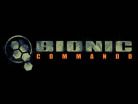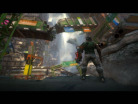- CLASSIC MAGAZINES
- REVIEW CREW
A show recapping what critics thought back
when classic games first came out! - NEXT GENERATION'S BEST & WORST
From the worst 1-star reviews to the best
5-stars can offer, this is Next Generation! - NINTENDO POWER (ARCHIVE)
Experience a variety of shows looking at the
often baffling history of Nintendo Power! - MAGAZINE RETROSPECTIVE
We're looking at the absolutely true history of
some of the most iconic game magazines ever! - SUPER PLAY'S TOP 600
The longest and most ambitious Super NES
countdown on the internet! - THEY SAID WHAT?
Debunking predictions and gossip found
in classic video game magazines! - NEXT GENERATION UNCOVERED
Cyril is back in this spin-off series, featuring the
cover critic review the art of Next Generation! - HARDCORE GAMER MAGAZING (PDF ISSUES)
Download all 36 issues of Hardcore Gamer
Magazine and relive the fun in PDF form!
- REVIEW CREW
- ELECTRONIC GAMING MONTHLY
- ELECTRONIC GAMING MONTHLY RANKS
From Mario to Sonic to Street Fighter, EGM
ranks classic game franchises and consoles! - ELECTRONIC GAMING MONTHLY BEST & WORST
Counting down EGM’s best and worst reviews
going year by year, from 1989 – 2009! - ELECTRONIC GAMING BEST & WORST AWARDS
11-part video series chronicling the ups and
downs of EGM’s Best & Worst Awards!
- ELECTRONIC GAMING MONTHLY RANKS
- GAME HISTORY
- GAME OVER: STORY BREAKDOWNS
Long-running series breaking down game
stories and analyzing their endings! - A BRIEF HISTORY OF GAMING w/ [NAME HERE]
Real history presented in a fun and pithy
format from a variety of game historians! - THE BLACK SHEEP
A series looking back at the black sheep
entries in popular game franchises! - INSTANT EXPERT
Everything you could possibly want to know
about a wide variety of gaming topics! - FREEZE FRAME
When something familiar happens in the games
industry, we're there to take a picture! - I'VE GOT YOUR NUMBER
Learn real video game history through a series
of number-themed episodes, starting at zero! - GREAT MOMENTS IN BAD ACTING
A joyous celebration of some of gaming's
absolute worst voice acting!
- GAME OVER: STORY BREAKDOWNS
- POPULAR SHOWS
- DG NEWS w/ LORNE RISELEY
Newsman Lorne Riseley hosts a regular
series looking at the hottest gaming news! - REVIEW REWIND
Cyril replays a game he reviewed 10+ years
ago to see if he got it right or wrong! - ON-RUNNING FEUDS
Defunct Games' longest-running show, with
editorials, observations and other fun oddities! - DEFUNCT GAMES QUIZ (ARCHIVE)
From online quizzes to game shows, we're
putting your video game knowledge to the test!- QUIZ: ONLINE PASS
Take a weekly quiz to see how well you know
the news and current gaming events! - QUIZ: KNOW THE GAME
One-on-one quiz show where contestants
find out if they actually know classic games! - QUIZ: THE LEADERBOARD
Can you guess the game based on the classic
review? Find out with The Leaderboard!
- QUIZ: ONLINE PASS
- DEFUNCT GAMES VS.
Cyril and the Defunct Games staff isn't afraid
to choose their favorite games and more! - CYRIL READS WORLDS OF POWER
Defunct Games recreates classic game
novelizations through the audio book format!
- DG NEWS w/ LORNE RISELEY
- COMEDY
- GAME EXPECTANCY
How long will your favorite hero live? We crunch
the numbers in this series about dying! - VIDEO GAME ADVICE
Famous game characters answer real personal
advice questions with a humorous slant! - FAKE GAMES: GUERILLA SCRAPBOOK
A long-running series about fake games and
the people who love them (covers included)! - WORST GAME EVER
A contest that attempts to create the worst
video game ever made, complete with covers! - LEVEL 1 STORIES
Literature based on the first stages of some
of your favorite classic video games! - THE COVER CRITIC
One of Defunct Games' earliest shows, Cover
Critic digs up some of the worst box art ever! - COMMERCIAL BREAK
Take a trip through some of the best and
worst video game advertisements of all time! - COMIC BOOK MODS
You've never seen comics like this before.
A curious mix of rewritten video game comics!
- GAME EXPECTANCY
- SERIES ARCHIVE
- NINTENDO SWITCH ONLINE ARCHIVE
A regularly-updated list of every Nintendo
Switch Online release, plus links to review! - PLAYSTATION PLUS CLASSIC ARCHIVE
A comprehensive list of every PlayStation
Plus classic release, including links! - RETRO-BIT PUBLISHING ARCHIVE
A regularly-updated list of every Retro-Bit
game released! - REVIEW MARATHONS w/ ADAM WALLACE
Join critic Adam Wallace as he takes us on a
classic review marathon with different themes!- DEFUNCT GAMES GOLF CLUB
Adam Wallace takes to the links to slice his way
through 72 classic golf game reviews! - 007 IN PIXELS
Adam Wallace takes on the world's greatest spy
as he reviews 15 weeks of James Bond games! - A SALUTE TO VAMPIRES
Adam Wallace is sinking his teeth into a series
covering Castlevania, BloodRayne and more! - CAPCOM'S CURSE
Adam Wallace is celebrating 13 days of Halloween
with a line-up of Capcom's scariest games! - THE FALL OF SUPERMAN
Adam Wallace is a man of steel for playing
some of the absolute worst Superman games! - THE 31 GAMES OF HALLOWEEN
Adam Wallace spends every day of October afraid
as he reviews some of the scariest games ever! - 12 WEEKS OF STAR TREK
Adam Wallace boldly goes where no critic has
gone before in this Star Trek marathon!
- DEFUNCT GAMES GOLF CLUB
- DAYS OF CHRISTMAS (ARCHIVE)
Annual holiday series with themed-episodes
that date all the way back to 2001!- 2015: 30 Ridiculous Retro Rumors
- 2014: 29 Magazines of Christmas
- 2013: 29 Questionable Power-Ups of Christmas
- 2012: 34 Theme Songs of Christmas
- 2011: 32 Game Endings of Christmas
- 2010: 31 Bonus Levels of Christmas
- 2009: 30 Genres of Christmas
- 2008: 29 Controls of Christmas
- 2007: 34 Cliches of Christmas
- 2006: 33 Consoles of Christmas
- 2005: 32 Articles of Christmas
- 2004: 31 Websites of Christmas
- 2003: 29 Issues of Christmas
- 2002: 28 Years of Christmas
- 2001: 33 Days of Christmas
- NINTENDO SWITCH ONLINE ARCHIVE
- REVIEW ARCHIVE
- FULL ARCHIVE
Bionic Commando
It's hard to believe that it's taken Capcom more than twenty years to publish a sequel for Bionic Commando. When I played Bionic Commando back in the 1980s (first in the arcade and then at home on my 8-bit Nintendo Entertainment System), I was struck by how cool the character was, how much fun it was to swing about and how I could routinely surprise myself by narrowly making insane grabs to save my life. I was so into the game that I even picked up the remixed version found on the Game Boy, hoping that it would continue the story. It didn't. And instead I was forced to sit patiently for 21 years before I learned what happened to Nathan "Rad" Spencer.
This new game takes place about a decade after the events of the original NES game, which in turn took place in 198X. From the outset one thing is definitely clear: The 1990s were not a cheerful time in the fictional Ascension City. Thanks to political strife and a radioactive blast, Ascension City is in dire straits. The city is practically unrecognizable in its current state, full of city streets being sucked into the earth and buildings ready to fall over. But that's not going to stop our hero from swinging into action and saving the day.
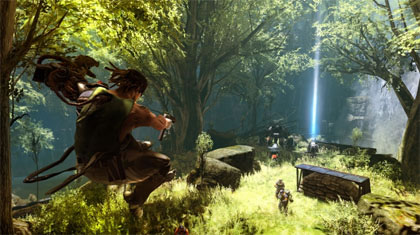
There's a fairly weak story here, one that revolves around Super Joe (captive of the first game, hero of Commando) breaking Nathan Spencer out of prison and giving him his life back ... at a cost. Apparently some of the bad guys from the first game have started to cause trouble again, so THE Bionic Commando is forced to go from area to area kicking ass and making the city safe again (well, as safe as a city rocked by a massive earthquake can be). Nathan agrees to do this, but only because he's desperate to know what happened to his wife, who he believes to be long-dead.
There problem with the story is that it never makes a lot of sense. Perhaps it doesn't need to, I don't remember the first game having a memorable storyline yet I still love it. But this story doesn't feel very natural. I don't really buy the premise of the game, for one thing. Plus, time in prison has turned Nathan into kind of a dick. You can tell that the stuff about his wife were added to soften up his image, but I never found myself connecting to this fairly boring character. The other problem is that the story tends to be light at first and then get bogged down with predictable twists and turns. Couple all this with one of the least satisfying endings I have ever seen and you have a story so incoherently awful that you're better off just ignoring it.
Thankfully developers GRIN (who also worked on last year's stunning Bionic Commando Rearmed) have done a better job with the gameplay than the storytelling. It's okay to be nervous about turning one of the most iconic 2D action games Capcom ever made into a slick 3D third-person shooter. Anybody who has suffered through playing through the game on the NES will tell you that it's hard enough swinging around in 2D, you would think that the added perspective would just get in the way.
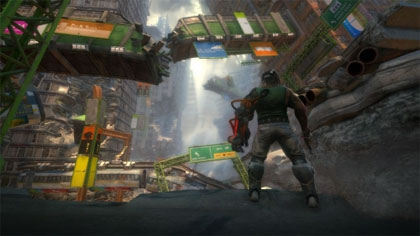
Oddly enough, I actually found myself having a considerably easier time playing the game in 3D than I did in 2D. For one thing, the arm mechanic is infinitely more forgiving, allowing you to clamp on to just about any surface that is within reach. In fact, you don't even need to push a button at just the right time to deploy your bionic arm. All you need to do is hold the left trigger button and wait for a ledge, lamp post, traffic sign, cave ceiling, whatever, to get in your way. For the most part you can find something, even if it means working your way back up. You will still fall to your death more times than you would like to admit, but at least in this game you have a real chance of saving yourself at the last moment.
GRIN really managed to capture the magic of swinging around and climbing tall surfaces with your bionic arm. Every single level is designed with the arm in mind, which means that you will always have plenty of places to explore and latch on to. At first the bionic arm feels a little strange; while it's forgiving, it's nowhere near as forgiving as something like a Spider-Man game (which is a better comparison than you may initially realize). You will still need to latch on to things, but all this is made easier with quick look buttons and a reliable trigger button. Once you get the hang of swinging you will have a lot of fun, even if it's marred by radiation zones that keep you from going too high (or low).
Unfortunately the game's gunplay is not nearly as interesting. In fact, some would argue that it's downright poor. For the most part you are stuck with your basic hand gun, which gets the job done but is slow and doesn't hold enough bullets. You can pick up other weapons, including a basic machine gun, a grenade launcher, a missile launcher and something that resembles a shotgun. Using these weapons can be a real pain at times, especially when in a clutch situation. Fiddling around to aim in, find a target and shoot is a real nuisance and definitely gets frustrating the further you get.
About halfway through the game you earn an alternative to wasting all your bullets. The game actually teaches you (for the second time, assuming you did the forced tutorial at the beginning) how to pick up large objects with your arm and whip them at your opponents. Not only is this incredibly effective, but it's about the most fun you can have in the game. There's something satisfying about picking up a car and throwing it into a large gathering of baddies. Most of the time a direct hit means instant death, and if you can time it right you can knock out multiple enemies with only one object.
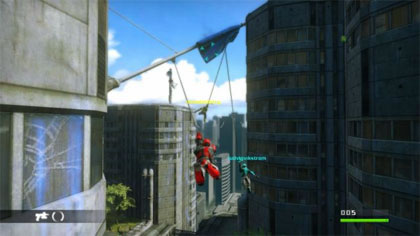
But that move, along with several others earned in the game, come only after you've mastered swinging and beaten up hundreds of bad guys. The rest of the game plays out with you frantically trying to dodge bullets, climb ledges and not get yourself killed. You do not want to get yourself killed. If you do manage to die, you will be forced to start back at the checkpoint, which could be quite a ways back. Even worse, all of the items you picked up along the way will be reset back into the level. The the same cannot be said for all of those hard to reach hidden items. If you die, you will likely have to go out of your way to collect all of those hidden items all over again. This alone contributes to a good chunk of the game's frustration.
But as frustrating as I am making it out to be, it has nothing on the 2D original. In that game you could get hit once and die. This new Bionic Commando sequel takes into account the last twenty years of gaming making, which means that it's not nearly as difficult as its 8-bit predecessor. You don't have to worry too much about getting hit with a bullet or two, you just need to hide for a few seconds and get your health back. Without a life bar (or instant deaths) the game feels considerably easier, and with the exception of only one or two spots, I always felt like I was in complete control. Thankfully there are a couple of harder difficulty settings, but no matter how hard you make it, the game will never be as frustrating as that first game.
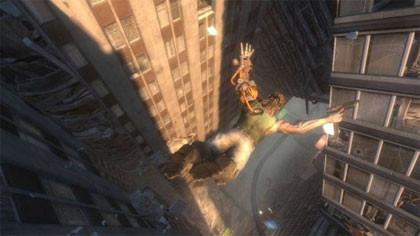
The levels are all really interesting, even though none of them break any new ground. For the most part the game is linear, but the levels are wide enough to give you multiple ways to attack them. You can take the high route, which involves you climbing buildings and avoiding the riffraff down below, or you can take the low path and shoot your way through. Not every area has these kinds of choices, but enough of them do to keep you looking around for multiple ways to complete a mission.
The game's story isn't open enough to have you covering a lot of diverse locations, so you'll find yourself mostly fighting your way through different parts of the now-crumbling Ascension City. You start in the destroyed downtown area, but quickly you'll be swinging your way through tunnels, a giant park and even an oil rig. Those that played through the original game will feel right at home with most of these locations, though a little more diversity wouldn't have hurt. Don't go in expecting a lot of wild and crazy locales, you aren't going to go from the freezing cold to a flaming mountaintop. Instead you're going to go from the city park to that big building that is right next to the city park.
And while it's not a huge deal, I did notice that there was an awful lot of advertising lining Ascension City. Everywhere you go you'll see commercials for cell phones, other Capcom games and Pepsi. Way, way too many Pepsi ads. Then again, since this game takes place in 199X, these Pepsi ads feel right at home. Still, the advertising can really pull you out of this fictional backdrop.
Despite all of the drastic changes, the game still feels like a Bionic Commando game. Using your arm is just as much fun as I remembered it back in the 1980s; only now with considerably better graphics. In fact, the only thing that hasn't improved is poor old Nathan "Rad" Spencer. This post-Prison Spencer has changed, and not for the better. He went in a skinny red-head and came out a muscular brunette with dreadlocks. If he's Conan O'Brien in the first game, then he's a buffed up Jake Gyllenhaal with Bob Marley's hair. Thankfully Bionic Commando Rearmed owners can type in a code to unlock the classic look. Either way, Nathan has come a long way since the NES cover art.
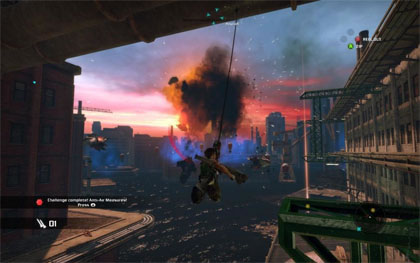
The game's graphics are good, for the most part. There are areas in the game where I literally slowed down the camera and studied the detail. Some of the underground locations are stunning looking. However, the game's visuals don't look nearly as crisp when the people begin speaking. What's more, I found noticeable slowdowns when battling large groups of bad guys (and a certain boss). Technical imperfections aside, the game does have a strong look from beginning to end. Any complaining would just be nitpicking at this point.
Bionic Commando isn't an especially long game, either. Most gamers shouldn't have trouble getting through the game in less than ten hours, though I suspect a dedicated gamer could cut that time in half. The cinemas add some minutes to the clock, but none of them are interesting enough to watch more than once. And, like I said, the story has too many imperfections to even be bothered with. At one point you're introduced to a female character who is never explained or resolved. She meets a fate that implies that maybe we won't get resolution with her character, either. Actually, that's the whole problem with the game. It has all of these great idea, but we never get any closure. Nothing much gets resolved. Even after you've beaten up all of the bad guys, it doesn't really feel like anything will change. I'm sure this is just the set-up for a Bionic Commando 2 (or 3, as it should be), but it's hard to be satisfied by the way this game wraps up.
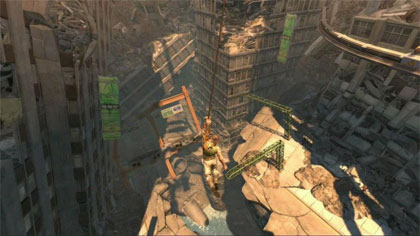
Outside of the short single-player campaign, there's an online multiplayer mode. Like the single-player game, the online mode has a lot of untapped potential. It's hard not to get excited about a Gears of War-style multiplayer game that allows you to climb huge buildings and swing from one place to the next. And at first this game does exactly that. The problem is that it doesn't do anything else. All of the multiplayer modes are as generic as they come and there isn't enough content to keep you going for very long. As great as this idea is, it's going to take another installment or two before Capcom gets it perfect.
Bionic Commando is a strong action game, but it's nowhere near as groundbreaking as the first game. The groundwork has definitely been set for this franchise and I'm excited to see where Capcom can take it. As a first attempt it's not bad, but GRIN plays it a little too safe for my taste. It's great to have Nathan "Rad" Spencer back, how about next time we send him on a much more ambitious battle.
HOME |
CONTACT |
NOW HIRING |
WHAT IS DEFUNCT GAMES? |
NINTENDO SWITCH ONLINE |
RETRO-BIT PUBLISHING
Retro-Bit |
Switch Planet |
The Halcyon Show |
Same Name, Different Game |
Dragnix |
Press the Buttons
Game Zone Online | Hardcore Gamer | The Dreamcast Junkyard | Video Game Blogger
Dr Strife | Games For Lunch | Mondo Cool Cast | Boxed Pixels | Sega CD Universe | Gaming Trend
Game Zone Online | Hardcore Gamer | The Dreamcast Junkyard | Video Game Blogger
Dr Strife | Games For Lunch | Mondo Cool Cast | Boxed Pixels | Sega CD Universe | Gaming Trend
Copyright © 2001-2025 Defunct Games
All rights reserved. All trademarks are properties of their respective owners.
All rights reserved. All trademarks are properties of their respective owners.







